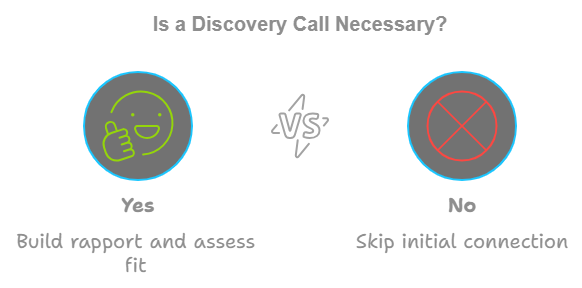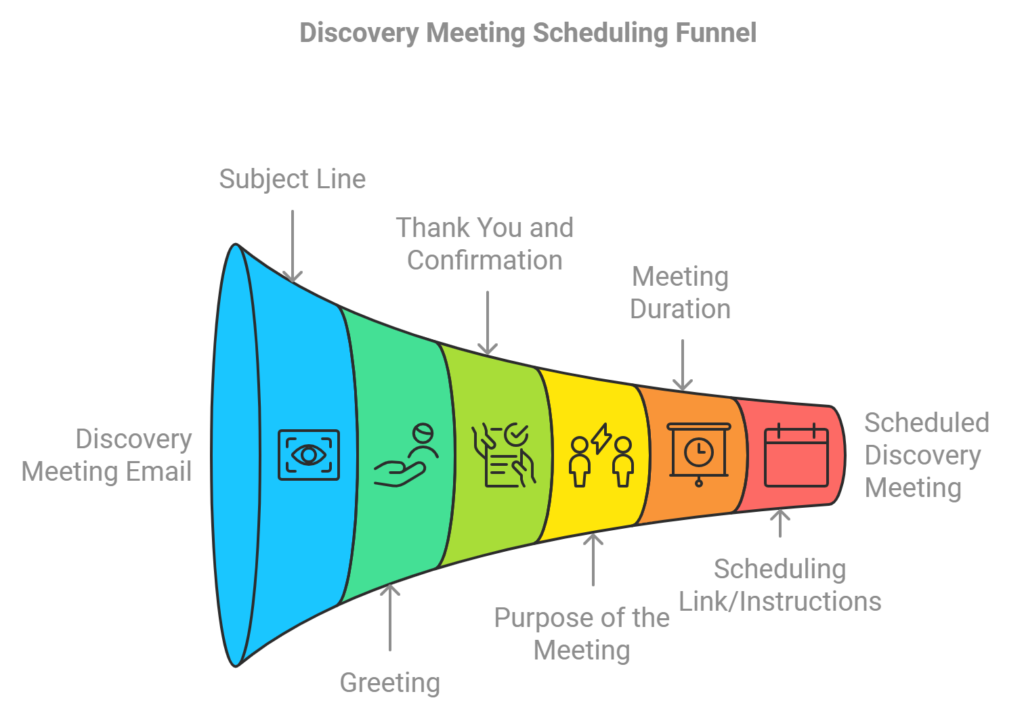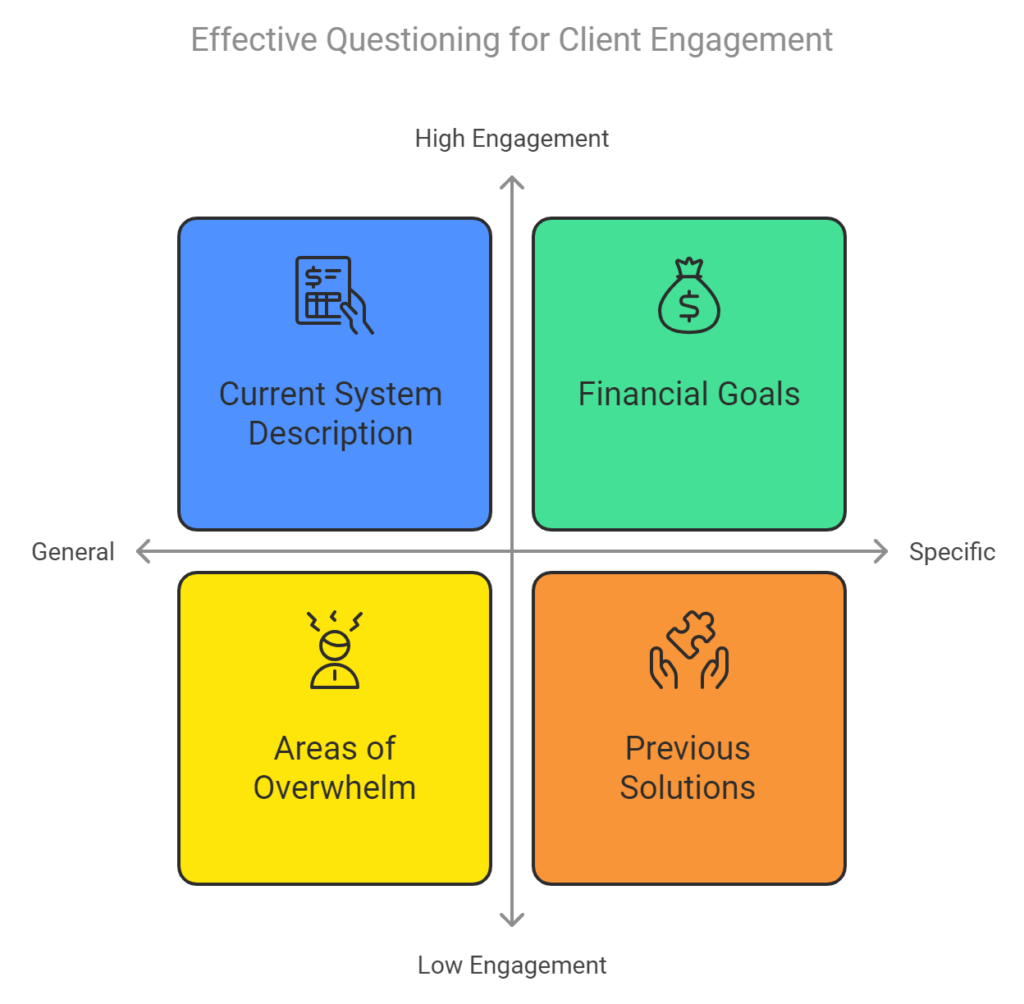1. What is a Discovery Call?
A discovery call is an initial meeting between you and a potential client, where both parties get to know each other, typically before any formal engagement takes place.
This call serves as a way for both parties to evaluate if they are a good fit for each other. The main goal is to gather essential information about the client’s needs and their current accounting or bookkeeping situation and discuss how your services can meet those needs.
It’s also an opportunity to showcase your expertise, answer questions, and establish rapport, which is essential for building long-term client relationships.

2. Pre-Discovery Call Filtering
Before scheduling a discovery call, it’s important to filter potential clients to make sure the call will be productive and beneficial for both sides.
This process involves reviewing the client’s initial inquiry or application to see if their needs align with the services you offer. By doing this, you can avoid spending time on leads that aren’t a good fit for your business.
Key factors to consider during filtering include the client’s industry, the size of their business, the accounting software they use, and their expectations for the services they need.
Here are a few quick filters to keep in mind:
3. Pre-Discovery Call Screening Questionnaire
A screening questionnaire helps you collect essential information about the prospective client before the call, allowing you to decide whether to move forward with scheduling a call.
This will save both you and the other party time. This form can collect important details about potential clients—such as their business type, size, industry, needs, and budget—so you can quickly decide if they’re a good fit for your services.
A simple Microsoft Forms or Google Forms questionnaire can be used to gather this information. To simplify the process, you can add a screening inquiry form to your website. Below are some examples of questions you can ask:
Click here for the pre-discovery screening questionnaire in PDF form or see how it can be installed as a form on your website.
4. Discovery Meeting Schedule Email Template
Once you’ve filtered potential clients and they pass the screening questionnaire, it’s time to schedule the discovery meeting.
A clear and structured scheduling email ensures that no step is missed, and it allows both parties to plan adequately for the meeting.

Here’s a brief summary of what should be included in the discovery meeting scheduling email:
Click here for a sample Discovery Meeting Invitation email.
5. Preparing for a Discovery Call
Before the call, make sure you’re well-prepared so you can make the most of your time together. Here’s how to get ready:

Click here for the guide: Preparing for a Discovery Call for CPAs and Bookkeepers.
6. Asking Questions to Determine Value
When talking to potential clients, it’s important to ask the right questions to uncover their challenges, goals, and emotions. This helps you understand the gap between where they are now and where they want to be. By identifying these pain points and obstacles, you can tailor your services to meet their specific needs and demonstrate the value you provide. When clients see that you truly understand their challenges and offer personalized solutions, they are more likely to trust your services and view them as an investment in their success.
Here are some simple, useful questions:
Click here for a sample of Questions to Identify Value, Pain Points, and Emotions: Bridging the Gap for Potential Clients, and a Bookkeeping Scenario: Identifying Value, Pain Points, and Emotions.
7. Discovery Meeting Script
A structured script can be incredibly useful in ensuring the discovery call flows smoothly. Below is a sample script outline for a successful discovery meeting:
Introduction: “Hi [Client’s Name], thank you for taking the time to chat with me today. I’m excited to learn more about your business and see how we might be able to work together.”
Overview of the Call: “To give you an idea of what we’ll cover today, I’d love to start by learning a bit more about your current bookkeeping or accounting setup. Then, I’ll share how my services might fit your needs, and we’ll wrap up with any questions you may have.”
Client’s Needs: “I see from your questionnaire that you’re currently using QuickBooks Online, but you’re having some issues keeping up with monthly reconciliations. Could you tell me more about the specific challenges you’ve been facing?”
Presenting Your Services: “Based on what you’ve shared, it sounds like our monthly bookkeeping service, where we handle reconciliations, would be a great fit. This would help you stay on top of your finances without worrying about the day-to-day details.”
Next Steps: “If this sounds like what you’re looking for, we can move forward by discussing the details of how we’ll work together. I’ll send over a proposal after this call, and we can schedule a follow-up meeting to go over any questions you might have.”
Closing: “Thank you so much for your time, [Client’s Name]. I’ll be in touch shortly with more details, and feel free to reach out if you have any additional questions.”
Want to streamline your discovery calls and close more clients? Click here for a detailed Discovery Call Sales Script for CPAs and Bookkeepers. This script will guide you through building rapport, identifying client pain points, presenting tailored solutions, and setting the next steps to convert more prospects into clients.